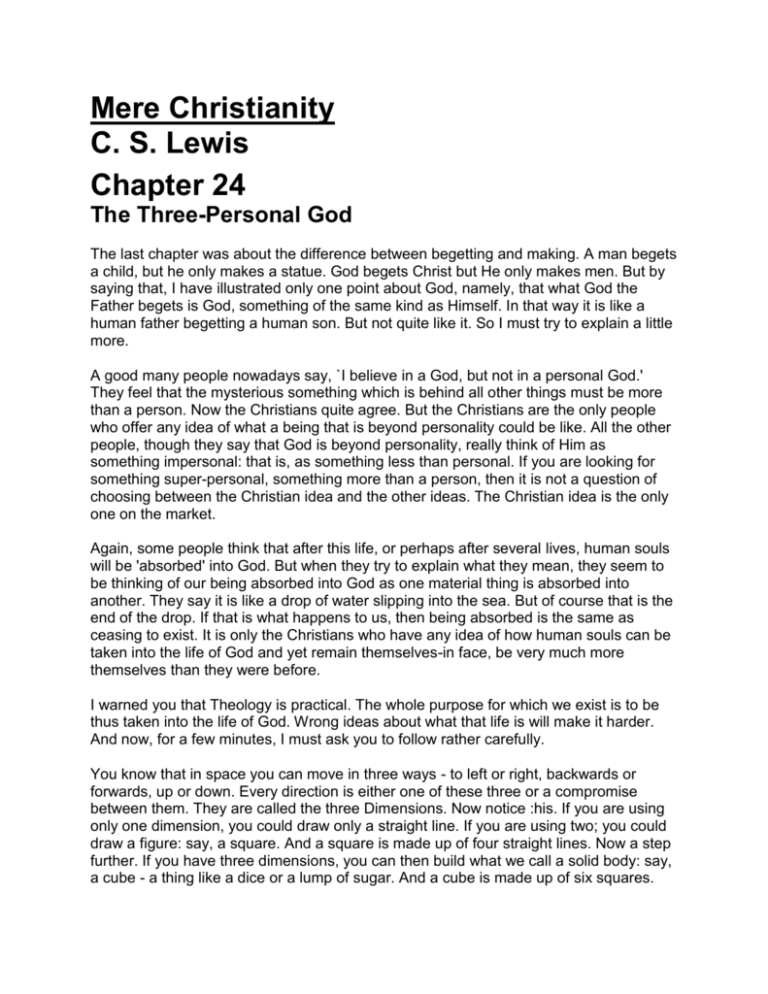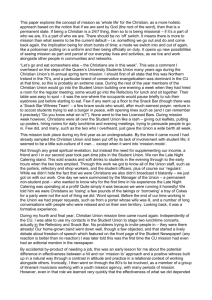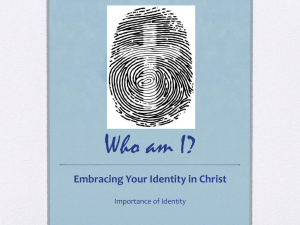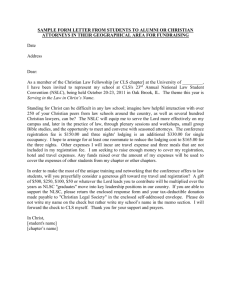Mere Christianity C. S. Lewis Chapter 24
advertisement

Mere Christianity C. S. Lewis Chapter 24 The Three-Personal God The last chapter was about the difference between begetting and making. A man begets a child, but he only makes a statue. God begets Christ but He only makes men. But by saying that, I have illustrated only one point about God, namely, that what God the Father begets is God, something of the same kind as Himself. In that way it is like a human father begetting a human son. But not quite like it. So I must try to explain a little more. A good many people nowadays say, `I believe in a God, but not in a personal God.' They feel that the mysterious something which is behind all other things must be more than a person. Now the Christians quite agree. But the Christians are the only people who offer any idea of what a being that is beyond personality could be like. All the other people, though they say that God is beyond personality, really think of Him as something impersonal: that is, as something less than personal. If you are looking for something super-personal, something more than a person, then it is not a question of choosing between the Christian idea and the other ideas. The Christian idea is the only one on the market. Again, some people think that after this life, or perhaps after several lives, human souls will be 'absorbed' into God. But when they try to explain what they mean, they seem to be thinking of our being absorbed into God as one material thing is absorbed into another. They say it is like a drop of water slipping into the sea. But of course that is the end of the drop. If that is what happens to us, then being absorbed is the same as ceasing to exist. It is only the Christians who have any idea of how human souls can be taken into the life of God and yet remain themselves-in face, be very much more themselves than they were before. I warned you that Theology is practical. The whole purpose for which we exist is to be thus taken into the life of God. Wrong ideas about what that life is will make it harder. And now, for a few minutes, I must ask you to follow rather carefully. You know that in space you can move in three ways - to left or right, backwards or forwards, up or down. Every direction is either one of these three or a compromise between them. They are called the three Dimensions. Now notice :his. If you are using only one dimension, you could draw only a straight line. If you are using two; you could draw a figure: say, a square. And a square is made up of four straight lines. Now a step further. If you have three dimensions, you can then build what we call a solid body: say, a cube - a thing like a dice or a lump of sugar. And a cube is made up of six squares. Do you see the point? A world of one dimension would be a straight line. In a twodimensional world, you still get straight lines, but many lines make one figure. In a three-dimensional world, you still get figures but many figures make one solid body. In other words, as you advance to more real and more complicated levels, you do not leave behind you the things you found on the simpler levels: you still have them, but combined in new ways - in ways you could not imagine if you knew only the simpler levels. Now the Christian account of God involves just the same principle. The human level is a simple and rather empty level. On the human level one person is one being, and any two persons are two separate beings - just as, in two dimensions (say on a flat sheet of paper) one square is one figure, and any two squares are two separate figures. On the Divine level you still find personalities; but up there you find them combined in new ways which we, who do not live on that level, cannot imagine. In God's dimension, so to speak, you find a being who is three Persons while remaining one Being, just as a cube is six squares while remaining one cube. Of course we cannot fully conceive a Being like that: just as, if we were so made that we perceived only two dimensions in space we could never properly imagine a cube. But we can get a sort of faint notion of it. And when we do, we are then, for the first time in our lives, getting some positive idea, however faint, of something super-personal - something more than a person. It is something we could never have guessed, and yet, once we have been told, one almost feels one ought to have been able to guess it because it fits in so well with all the things we know already. You may ask, 'if we cannot imagine a three-personal Being, what is the good of talking about Him?' Well, there isn't any good talking about Him. The thing that matters is being actually drawn into that three-personal life, and that may begin any time - to-night, if you like. What I mean is this. An ordinary simple Christian kneels down to say his prayers. He is trying to get into touch with God. But if he is a Christian he knows that what is prompting him to pray is also God: God, so to speak, inside him. But he also knows that all his real knowledge of God comes through Christ, the Man who was God - that Christ is standing beside him, helping him to pray, praying for him. You see what is happening. God is the thing to which he is praying the goal he is trying to reach. God is also the thing inside him which is pushing him on - the motive power. God is also the road or bridge along which he is being pushed to that goal. So that the whole threefold life of the threepersonal Being is actually going on in that ordinary little bedroom where an ordinary man is saying his prayers. The man is being caught up into the higher kinds of life what I called Zoe or spiritual life: he is being pulled into God, by God, while still remaining himself. And that is how Theology started. People already knew about God in a vague way. Then came a man who claimed to be God; and yet He was not the sort of man you could dismiss as a lunatic. He made them believe Him. They met Him again after they had seen Him killed. And then, after they had been formed into a little society or community, they found God somehow inside them as well: directing them, making them able to do things they could not do before. And when they worked it all out they found they had arrived at the Christian definition of the three-personal God. This definition is not something we have made up; Theology is, in a sense, an experimental science. It is simple religions that are the made-up ones. When I say it is an experimental science 'in a sense,' I mean that it is like the other experimental sciences in some ways, but not in all. If you are a geologist studying rocks, you have to go and find the rocks. They will not come to you, and if you go to them they cannot run away. The initiative lies all on your side. They cannot either help or hinder. But suppose you are a zoologist and want to take photos of wild animals in their native haunts. That is a bit different from studying rocks. The wild animals will not come to you: but they can run away from you. Unless you keep very quiet, they will. There is beginning to be a tiny little trace of initiative on their side. Now a stage higher; suppose you want to get to know a human person. If he is determined not to let you, you will not get to know him. You have to win his confidence. In this case the initiative is equally divided-it takes two to make a friendship. When you come to knowing God, the initiative lies on His side. If He does not show Himself, nothing you can do will enable you to find Him. And, in fact, He shows much more of Himself to some people than to others - not because He has favourites, but because it is impossible for Him to show Himself to a man whose whole mind and character are in the wrong condition. Just as sunlight, though it has no favourites, cannot be reflected in a dusty mirror as clearly as in a clean one. You can put this another way by saving that while in other sciences the instruments you use are things external to yourself (things like microscopes and telescopes), the instrument through which you see God is your whole self. And if a man's self is not kept clean and bright, his glimpse of God will be blurred - like the Moon .seen through a dirty telescope. That is why horrible nations have horrible religions: they have been looking at God through a dirty lens. God can show Himself as He really is only to real men. And that means not simply to men who are individually good, but to men who are united together in a body, loving one another, helping one another, showing Him to one another. For that is what God meant humanity to be like: like players in one band, or organs in one body. Consequently, the one really adequate instrument for learning about God is the whole Christian community, waiting for Him together. Christian brotherhood is, so to speak, the technical equipment for this science - the laboratory outfit. That is why all these people who turn up every few years with some patent simplified religion of their own as a substitute for the Christian tradition are really wasting time. Like a man who has no instrument but an old pair of field glasses setting out to put all the real astronomers right. He may be a clever chap - he may be cleverer than some of the real astronomers, but he is not giving himself a chance. And two years later everyone has forgotten all about him, but the real science is still going on. If Christianity was something we were making up, of course we could make it easier. But it is not. We cannot compete, in simplicity, with people who are inventing religions. How could we? We are dealing with Fact. Of course anyone can be simple if he has no facts to bother about. CHAPTER 26 GOOD INFECTION I begin this chapter by asking you to get a certain picture clear in your minds. Imagine two books lying on a table one on top of the other. Obviously the bottom book is keeping the other one up-supporting it. It is because of the underneath book that the top one is resting, say, two inches from the surface of the table instead of touching the table. Let us call the underneath book A and the top one B. The position of A is causing the position of B. That is clear? Now let us imagine - it could not really happen, of course, but it will do for an illustration -let us imagine that both books have been in that position for ever and ever. In that case B's position would always have been resulting from A's position. But all the same, A's position would not have existed before B's position. In other words the result does not come after the cause. Of course, results usually do: you eat the cucumber first and have the indigestion afterwards. But it is not so with all causes and results. You will see in a moment why I think this important. I said a few pages back that God is a Being which contains three Persons while remaining one Being, just as a cube contains six squares while remaining one body. But as soon as I begin trying to explain how these Persons are connected I have to use words which make it sound as if one of them was there before the others. The First Person is called the Father and the Second the Son. We say that the First begets or produces the second; we call it begetting, not making, because what He produces is of the same kind as Himself. In that way the word Father is the only word to use. But unfortunately it suggests that He is there first-just as a human father exists before his son. But that is not so. There is no before and after about it. And that is why I think it important to make clear how one thing can be the source, or cause, or origin, of another without being there before it. The Son exists because the Father exists: but there never was a time before the Father produced the Son. Perhaps the best way to think of it is this. I asked you just now to imagine those two books, and probably most of you did. That is, you made an act of imagination and as a result you had a mental picture. Quite obviously your act of imagining was the cause and the mental picture the result. But that does not mean that you first did the imagining and then got the picture. The moment you did it, the picture was there. Your will was keeping the picture before you all the time. Yet that act of will and the picture began at exactly the same moment and ended at the same moment. If there were a Being who had always existed and had always been imagining one thing, his act would always have been producing a mental picture; but the picture would be just as eternal as the act. In the same way we must think of the Son always, so to speak, streaming forth from the Father, like light from a lamp, or heat from a fire, or thoughts from a mind. He is the selfexpression of the Father-what the Father has to say. And there never was a time when He was not saying it. But have you noticed what is happening? All these pictures of light or heat are making it sound as if the Father and Son were two things instead of two Persons. So that after all, the New Testament picture of a Father and a Son turns out to be much more accurate than anything we try to substitute for it. That is what always happens when you go away from the words of the Bible. It is quite right to go away from them for a moment in order to make some special point clear. But you must always go back. Naturally God knows how to describe Himself much better than we know how to describe Him. He knows that Father and Son is more like the relation between the First and Second Persons than anything else we can think of. Much the most important thing to know is that it is a relation of love. The Father delights in His Son; the Son looks up to His Father. Before going on, notice the practical importance of this. All sorts of people are fond of repeating the Christian statement that 'God is love.' But they seem not to notice that the words 'God is love' have no real meaning unless God contains at least two Persons. Love is something that one person has for another person. If God was a single person, then before the world was made, He was not love. Of course, what these people mean when they say that God is love is often something quite different: they really mean 'Love is God.' They really mean that our feelings of love, however and wherever they arise, and whatever results they produce, are to be treated with great respect. Perhaps they are: but that is something quite different from what Christians mean by the statement 'God is love.' They believe that the living, dynamic activity of love has been going on in God forever and has created everything else. And that, by the way, is perhaps the most important difference between Christian and all other religions: that in Christianity God is not a static thing - not even a person - but a dynamic, pulsating activity, a life, almost a kind of drama. Almost, if you will not think me irreverent, a kind of dance. The union between the Father and the Son is such a live concrete thing that this union itself is also a Person. I know this is almost inconceivable, but look at it thus. You know that among human beings, when they get together in a family, or a club, or a trade union, people talk about the 'spirit' of that family, or club, or trade union. They talk about its 'spirit' because the individual members, when they are together. Do really develop particular ways of talking and behaving which they would not have if they were apart.' It is as if a sort of communal personality came into existence. Of course, it is not a real person: it is only rather like a person. But that is just one of the differences between God and us. What grows out of the joint life of the Father and Son is a real Person, is in fact the Third of the three Persons who are God. This third Person is called, in technical language, the Holy Ghost or the 'spirit' of God. Do not be worried or surprised if you find it (or Him) rather vaguer or more shadowy in your mind than the other two. I think there is a reason why that must be so. In the Christian life you are not usually looking at Him. He is always acting through you. If you think of the Father as something 'out there,' in front of you, and of the Son as someone standing at your side, helping you to pray, trying to turn you into another son, then you have to think of the third Person as something inside you, or behind you. Perhaps some people might find it easier to begin with the third Person and work backwards. God is love, and that love works through men-especially through the whole community of Christians. But this spirit of love is, from all eternity, a love going on between the Father and the Son. And now, what does it all matter? It matters more than anything else in the world. The whole dance, or drama, or pattern of this three-Personal life is to be played out in each one of us: or (putting it the other way round) each one of us has got to enter that pattern, take his place in that dance. There is no other way to the happiness for which we were made. Good things as well as bad, you know, are caught by a kind of infection. If you want to get warm you must stand near the fire: if you want to be wet you must get into the water. If you want joy, power, peace, eternal life, you must get close to, or even into, the thing that has them. They are not a sort of prizes which God could, if He chose, just hand out to anyone. They are a great fountain of energy and beauty spurting up at the very centre of reality. If you are close to it, the spray will wet you: if you are not, you will remain dry. Once a man is united to God, how could he not live forever? Once a man is separated from God, what can he do but wither and die? But how is he to be united to God? How is it possible for us to be taken into the threePersonal life? You remember what I said in Chapter 24 about begetting and making. We are not begotten by God, we are only made by Him: in our natural state we are not sons of God, only (so to speak) statues. We have not got Zoe or spiritual life: only Bios or biological life which is presently going to run down and die. Now the whole offer which Christianity makes is this: that we can, if we let God have His way, come to share in the life of Christ. If we do, we shall then be sharing a life which was begotten, not made, which always has existed and always will exist. Christ is the Son of God. If we share in this kind of life we also shall be sons of God. We shall love the Father as He does and the Holy Ghost will arise in us. He came to this world and became a man in order to spread to other men the kind of life He has - by what I call 'good infection'. Every Christian is to become a little Christ. The whole purpose of becoming a Christian is simply nothing else. *This corporate behaviour may, of course, be either better or worse than their individual behaviour.








